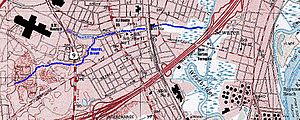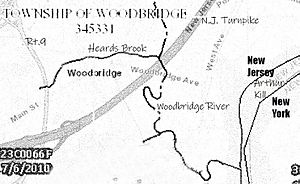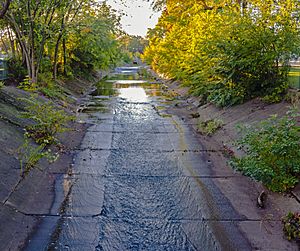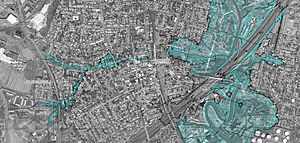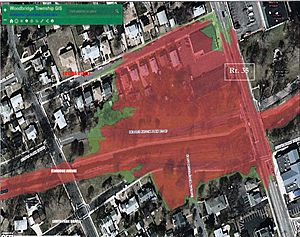Heards Brook facts for kids
Heards Brook is a small stream located in Woodbridge Township, Middlesex County, New Jersey, United States. It plays an important role in the local environment and has a history of flooding.
Contents
What is Heards Brook?
Heards Brook is a stream that flows for about 1.8 miles through Woodbridge. It starts in the western part of the township and flows eastward. The water from the brook eventually drains into Woodbridge Creek. From there, it travels southward into a larger waterway called Arthur Kill.
The Heards Brook Watershed
The area of land that collects and drains water into Heards Brook is called its watershed. This watershed covers about 135 acres. When rain falls in this area, it flows into the brook.
Understanding Flooding at Heards Brook
Heards Brook and Woodbridge Creek have often experienced flooding. This happens for a few reasons:
- Tidal Flooding: This type of flooding comes from the ocean's tides. When high tides are very strong, water can back up into the creek and brook.
- Fluvial Flooding: This is flooding caused by heavy rainfall. The brook's water levels can rise very quickly, leading to floods.
The land around Heards Brook is often covered by buildings and roads. This means that rain cannot soak into the ground easily. Instead, it runs off quickly, making floods worse. Also, the brook flows through areas with steep slopes.
Superstorm Sandy's Impact
The most severe flooding happened during Superstorm Sandy in 2012. The water level in Woodbridge Creek reached 12 feet high. Where Heards Brook meets the creek, the land is only about six feet above sea level. This low elevation makes the area very vulnerable to flooding.
Challenges with Water Flow
A large pipe called a culvert helps the brook flow under Route 35. This culvert is 12 feet wide and 6 feet tall. After Superstorm Sandy, fixing this culvert was a top priority for Woodbridge. However, water can still back up from this spot, causing floods further upstream. Even a small storm can cause flooding as far west as Elmwood Avenue.
Long-lasting coastal storms, like nor'easters, can combine tidal and fluvial flooding. This means the flooding in Heards Brook can last for days before the water goes down. Very big floods, which happen about once every ten years, can cause water to be four feet deep in the lowest areas.
Restoring the Environment
After Superstorm Sandy, Woodbridge Township took action. They bought many homes in the flood-prone areas near Heards Brook. As people move out of these areas, the land is being turned into a "flood plain forest." This means planting native trees, shrubs, and grass. This natural area will help soak up excess water and reduce future flooding. It also helps restore the natural environment.
Heards Brook Park
In the middle of Woodbridge, Heards Brook flows through Heards Brook Park. This park is a popular spot in Woodbridge. It has a wooded area, picnic tables, and stone pathways. Visitors can also enjoy basketball courts and nice views of the brook.
Plans are in place to connect smaller park areas along the eastern part of Heards Brook. This will create a larger green space. A bioswale might also be added. A bioswale is a landscape feature that helps clean stormwater runoff and slows down its flow.
Heards Brook and Brickmaking History
Around the 1860s, Woodbridge became famous for making bricks. Workers dug up large amounts of clay from the ground. The clay from Woodbridge was special because it could withstand very high heat, over 2000 degrees Fahrenheit. This clay was used to make "fire bricks." Heards Brook was often used as a landmark to show where different clay pits were located.
|
 | Delilah Pierce |
 | Gordon Parks |
 | Augusta Savage |
 | Charles Ethan Porter |


